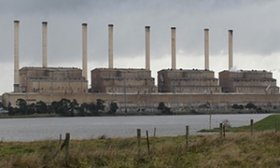Ecological footprint ranking
 The Hazelwood power station in the Latrobe Valley, Victoria: more than half of Australia’s footprint comprises carbon pollution. Photograph: David Crosling/AAP
The Hazelwood power station in the Latrobe Valley, Victoria: more than half of Australia’s footprint comprises carbon pollution. Photograph: David Crosling/AAP
Australians require a huge ecological “footprint” in order to sustain their lifestyles, with just 12 nations in the world using up more arable land and carbon-burning generation, according to new figures.
WWF’s Living Planet Index, which is conducted once every two years, has found that Australia requires 6.25 global hectares per person per year. A global hectare is a unit which averages out what productive land and ocean, such as cropland, forests and fishing grounds, can generate over the course of a year.
WWF says Australia is contributing to deforestation, overfishing and the release of more carbon into the atmosphere than forests and oceans can absorb.
More than half of Australia’s footprint is comprised of carbon pollution, followed by cropland and forest products.
However, Australia’s “built-up land” doesn’t cause a huge impact in the global scheme of things and the country’s ranking has actually improved since the last index, when it was placed seventh.
WWF estimates Earth’s bio-capacity to be about 12bn global hectares, amounting to about 1.7 global hectares for each person on the planet. If everyone lived as Australians did, we’d need more than three planet Earths to sustain their lifestyles.
According to the report, Kuwait has the largest ecological footprint in the world, at 10.36 global hectares per person. Timor Leste has the smallest, at 0.44 global hectares per person.
The US has the eighth largest footprint, while the UK comes in at number 28. China is ranked at number 75.
The index found that populations of fish, birds, mammals, amphibians and reptiles have declined by 52% since 1970. Freshwater species have fared particularly badly, suffering a 76% decline. Habitat loss, overfishing and hunting are cited as key threats to species and climate change is placing additional pressure on threatened animals.
Dermot O’Gorman, chief executive of WWF Australia, said the world is losing species at an “alarming rate”.
“There is slightly good news in that Australia is now only 13th worst, but our footprint is still pretty heavy, ” he told Guardian Australia. “In the big picture, it’s a minor change. We are still near the top of a ladder that we shouldn’t be on. It’s clearly not sustainable.
“We are doing some things well, but there is a need to do more with less, whether that’s farming or industry. We need to be smarter and provide resources to protect the animals that find refuge in national parks.”
|
C177847 Rediform Net Zero Carbon Desk Pad - Daily, Weekly, Monthly, Yearly - 22" x 17" - 1 Year - January 2015 till December 2015 - 1 Month Single Page Layout - Desk Pad - Chipboard - White Office Product (Rediform)
|